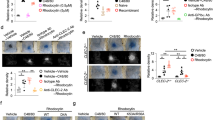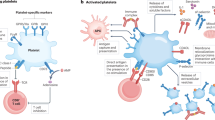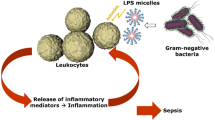Abstract
THAT histamine may be released from platelets both in vivo and in vitro in sensitized animals and in man during the course of antigen–antibody reactions has been known for some time, and attempts have been made to use this phenomenon for the in vitro diagnosis of clinical hypersensitivity states4. The liberation of serotonin as well as histamine from platelets by antigen–antibody reactions was described in detail by Humphrey and Jaques1 using platelets from several species including man. These workers used sera from rabbits immunized with either pneumococcus polysaccharide or ovalbumin and concluded that the release reaction required calcium ions and plasma or serum for maximal activity. Heating the plasma or serum to 56° C reduced the amount of serotonin or histamine released. Similar results were obtained by in vivo studies of anaphylaxis in the rabbit showing an increase in the plasma histamine and serotonin levels following challenge accompanied by a fall in the number of circulating platelets6,7. The aggregation of platelets by antigen–antibody complexes was described by Miescher and Cooper2 and also by Siqueira and Nelson5 as probably being caused by the combination of the complexes with one of the components of complement and this final complex binding on the platelet surface. More recently Movat, Mustard, Taichman and Uriuhara3 were able to show platelet aggregation and adenosine diphosphate (ADP) release as well as liberation of histamine and serotonin by the action of rabbit bovine serum albumin—anti-bovine serum albumin and ferritin—anti-ferritin complexes on human or pig platelets. They suggest that phagocytosis of the antigen–antibody complex releases ADP which causes aggregation and in turn releases serotonin, histamine and further ADP.
This is a preview of subscription content, access via your institution
Access options
Subscribe to this journal
Receive 51 print issues and online access
$199.00 per year
only $3.90 per issue
Buy this article
- Purchase on Springer Link
- Instant access to full article PDF
Prices may be subject to local taxes which are calculated during checkout
Similar content being viewed by others
References
Humphrey, J. H., and Jaques, R., J. Physiol., 128, 9 (1955).
Miescher, P., and Cooper, N., Vox Sang., 5, 138 (1960).
Movat, H. Z., Mustard, J. F., Taichman, N. S., and Uriuhara, T., Proc. Soc. Exp. Biol. and Med., 120, 232 (1965).
Shelley, W. B., and Comaish, J. S., J. Amer. Med. Assoc., 192, 36 (1965).
Siqueira, M., and Nelson, R. A., J. Immunol., 86, 516 (1961).
Waalkes, T. P., Weissbach, H., Bozicevich, J., and Udenfriend, S., J. Clin. Invest., 36, 1115 (1957).
Waalkes, T. P., Weissbach, H., Bozicevich, J., and Udenfriend, S., Proc. Soc. Exp. Biol. and Med., 95, 479 (1957).
de Weck, A. L., Nature, 202, 975 (1964).
Author information
Authors and Affiliations
Rights and permissions
About this article
Cite this article
CASPARY, E., COMAISH, J. Release of Serotonin from Human Platelets in Hypersensitivity States. Nature 214, 286–287 (1967). https://doi.org/10.1038/214286a0
Issue Date:
DOI: https://doi.org/10.1038/214286a0
Comments
By submitting a comment you agree to abide by our Terms and Community Guidelines. If you find something abusive or that does not comply with our terms or guidelines please flag it as inappropriate.



